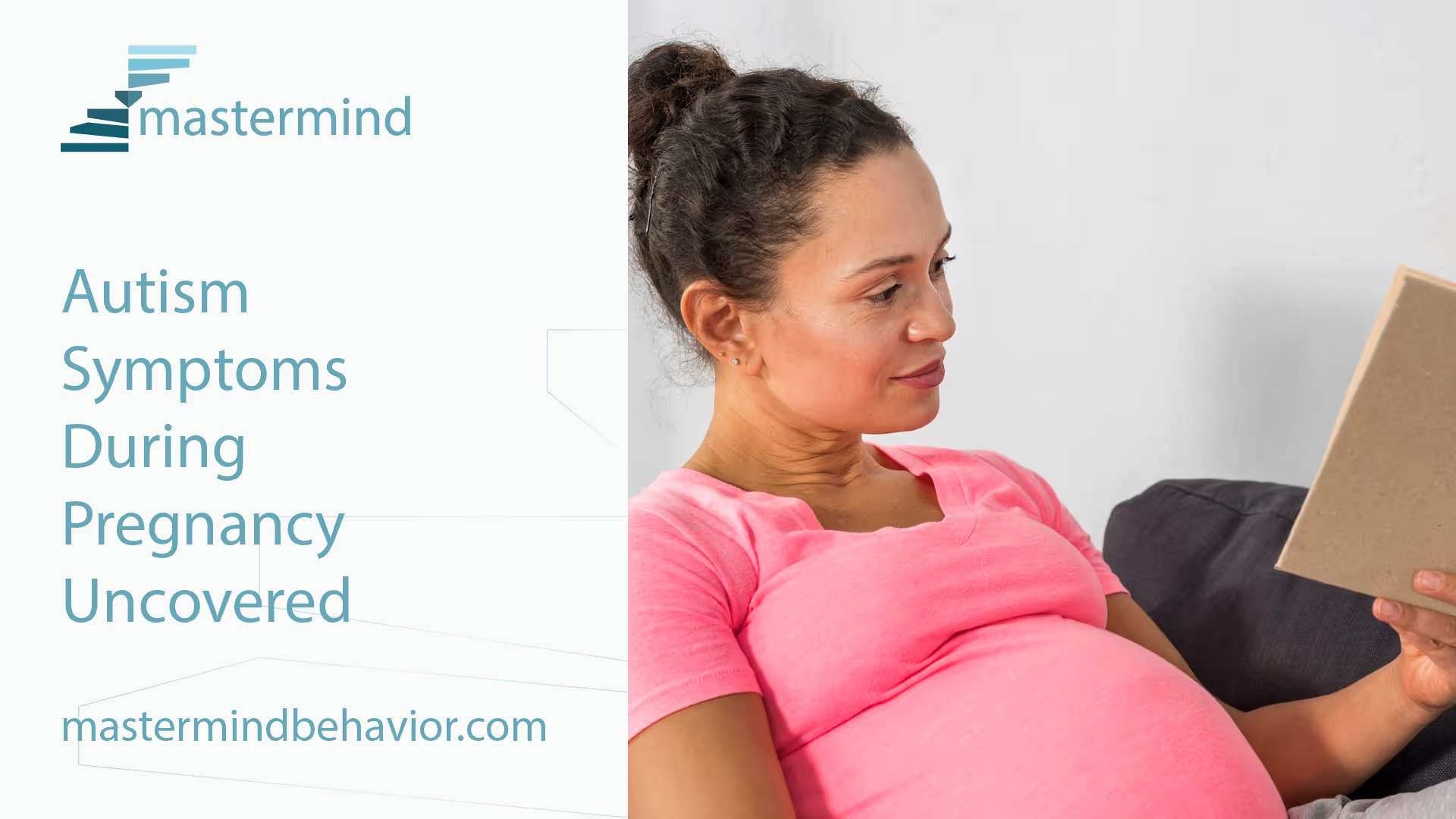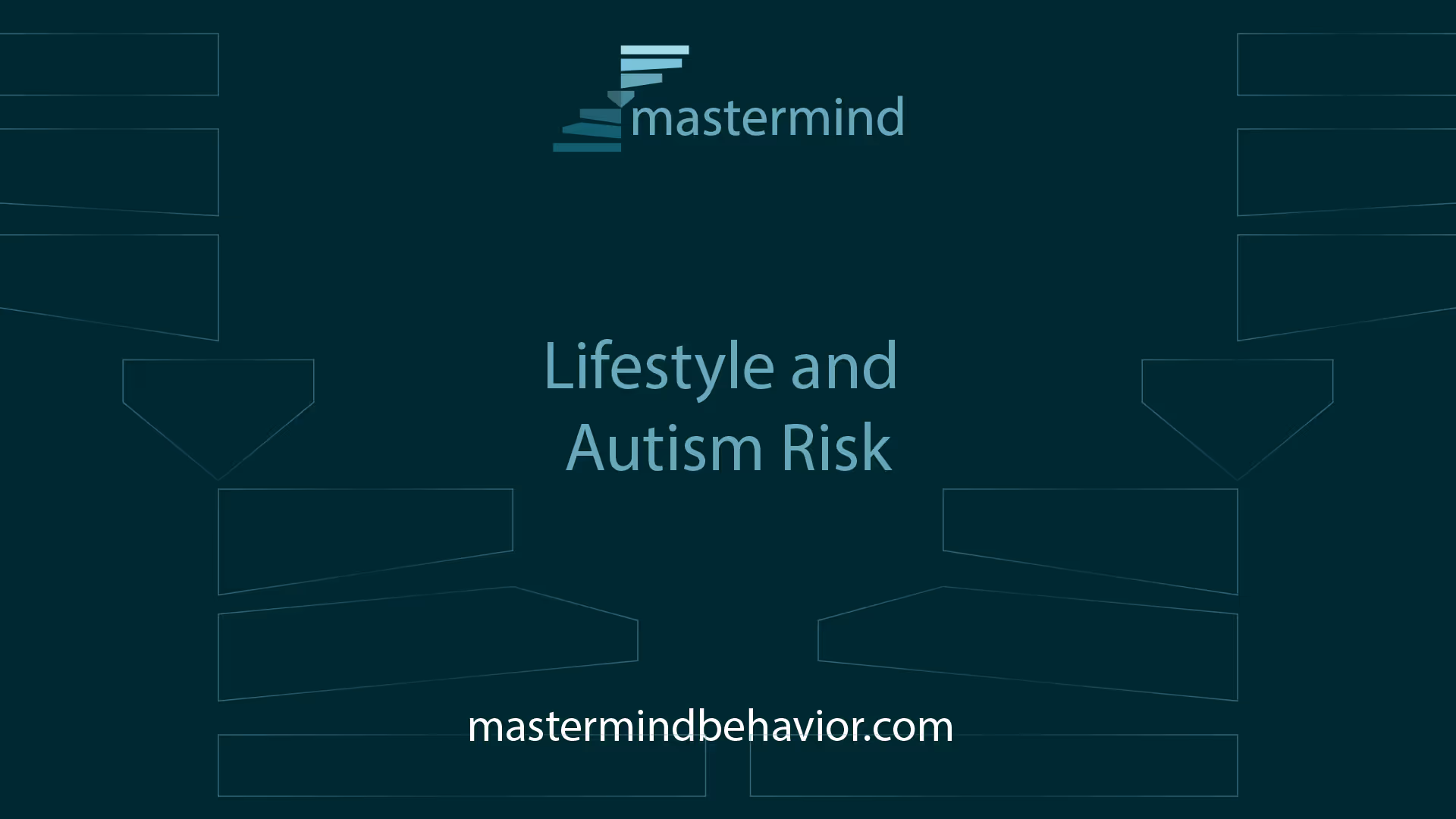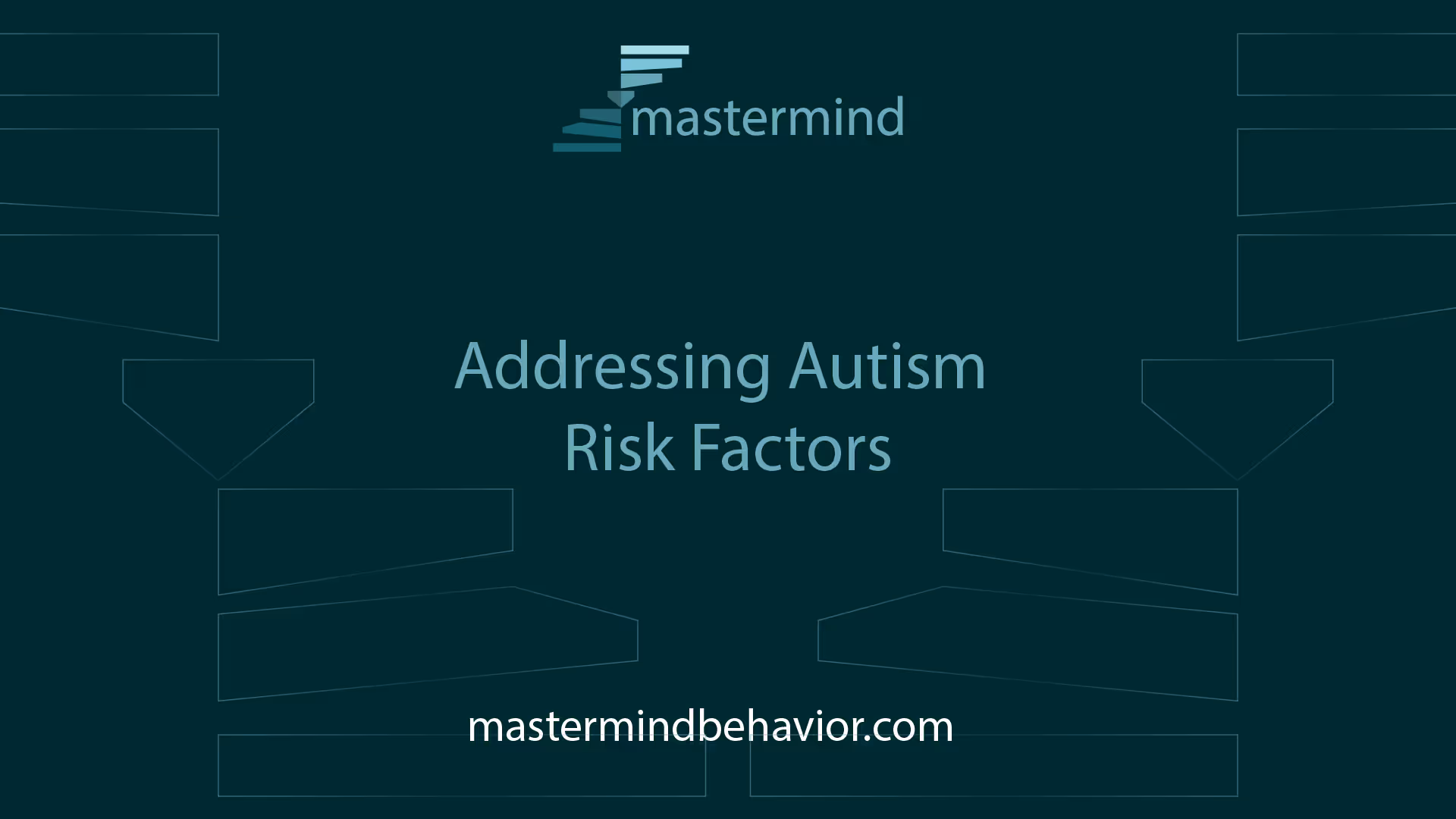Autism Symptoms During Pregnancy Uncovered

Understanding Autism Risks

Autism Spectrum Disorder (ASD) is influenced by a range of factors, which can generally be divided into two key categories: genetic influences and environmental factors. Understanding these elements can provide insight into potential autism symptoms during pregnancy.
Genetic Influences on Autism
Research has shown a strong genetic influence on the development of ASD. A study reported a 17.4-fold increase in the probability of having an autistic child if an older sibling has childhood autism compared to unaffected families. This suggests a significant heritability component to autism.
Another study emphasized the role of genetics in the occurrence of autism, estimating the direct heritability of ASD to be around 80% in a multi-national sample group. These findings underscore the importance of genetic factors in the development of ASD [1]. For more information about genetic influences and ASD, visit our page on autism and prenatal development.
Environmental Factors and Autism
In addition to genetic influences, certain environmental factors are also believed to interact with certain genes, potentially leading to autism. These factors include older parental age, fetal exposure to certain medication, and serious infection or obesity of the mother during pregnancy. These environmental elements are considered alongside genetic factors when contemplating prenatal testing for autism.
Several studies have found links between certain pregnancy-related factors and autism, such as the use of antiepileptic drugs, older parental age, preterm birth, and gestational diabetes. While these factors only slightly raise the risk of autism, minimizing these risks can reduce the likelihood of having an autistic child [2].
Additionally, a study by BMJ found an association between the risk of ASD and prenatal exposure to certain chemicals like glyphosate, chlorpyrifos, diazinon, malathion, avermectin, and permethrin.
Understanding both genetic and environmental risk factors for autism can help guide prenatal care and interventions, potentially reducing the likelihood of autism symptoms during pregnancy. For more on this, visit autism prevention during pregnancy and autism treatment during pregnancy.
Prenatal Factors Linked to Autism
When it comes to understanding autism, the prenatal period is paramount. Certain prenatal factors, including exposure to environmental risks and maternal health, have been linked to an increased risk of autism.
Prenatal Exposure Risks
Prenatal exposure to certain environmental hazards can increase the risk of autism in children. For instance, exposure to air pollution during pregnancy is associated with an increased risk of autism spectrum disorder (ASD), with certain windows of exposure and sex differences identified in the study.
Additionally, prenatal and early childhood exposure to heavy metals, such as mercury, lead, or arsenic; altered levels of essential metals like zinc or manganese; pesticides; and other contaminants have been linked to an increased risk of autism.
Furthermore, studies have shown that taking prenatal vitamins may help lower autism risk, with research suggesting that vitamins and supplements might provide protective effects for those exposed to certain environmental contaminants during pregnancy. To learn more about these protective measures, visit autism prevention during pregnancy.
Maternal Health During Pregnancy
Maternal health during pregnancy also plays a significant role in the risk of autism. Problems with a mother’s immune system, certain metabolic conditions, or inflammation during pregnancy may be linked with a higher autism risk for her children.
One important factor in maternal health is proper nutrition. A 2022 meta-analysis of 10 studies found that taking 400 micrograms (mcg) of folic acid in early pregnancy was associated with a reduced risk of autism. It is recommended that individuals who can get pregnant should consume between 400 to 800 mcg of folate or folic acid daily to lower the risk of autism.
Understanding the connection between prenatal factors and autism risk is crucial for early intervention and prevention strategies. By identifying potential risk factors during pregnancy, healthcare providers can guide expectant mothers towards the necessary steps to minimize these risks. For more information on autism and prenatal development, visit autism and prenatal development.
Medical Interventions and Autism
Medical interventions during pregnancy, including the use of certain medications and prenatal vitamins, can play a role in autism risk. Understanding how these factors influence the development of autism symptoms during pregnancy can provide valuable insights for potential preventative measures.
Medications and Autism Risk
Certain medications used during pregnancy have been associated with an increased risk of autism in children. For instance, the use of antiepileptic drugs, particularly valproate, has been shown to potentially raise the risk by as much as 10% [2].
Additionally, common medications like Tylenol (acetaminophen) have raised concerns due to potential links to increased risks for neurodevelopmental disorders such as autism and attention deficit hyperactivity disorder (ADHD).
It's essential for expecting mothers to discuss all medications with their healthcare provider to make informed decisions about their use during pregnancy. For more information, refer to our article on autism treatment during pregnancy.
Prenatal Vitamin Benefits
On the other hand, prenatal vitamins may play a protective role in mitigating autism risk. Studies funded by the National Institute of Environmental Health Sciences (NIEHS) have found that taking prenatal vitamins may help lower the risk of autism [4].
Research suggests that vitamins and supplements might provide protective effects for those exposed to certain environmental contaminants during pregnancy, such as air pollution, which has been associated with an increased risk of autism spectrum disorder (ASD).
This highlights the importance of proper nutrition and supplementation during pregnancy, not only for the overall health of the mother and baby but also in potentially reducing the risk of neurodevelopmental disorders. For more tips on how to minimize autism risk, read our article on autism prevention during pregnancy.
In conclusion, while certain medications have been linked to increased autism risk, other medical interventions like taking prenatal vitamins might offer protective effects. As researchers continue to uncover more about the complex relationships between prenatal exposures, medical interventions, and autism risk, these findings can guide future directions in autism research and potentially inform prevention strategies.
Lifestyle and Autism Risk

The lifestyle choices of expecting mothers can play a role in the risk of autism spectrum disorders (ASD). In this section, we delve into how nutrition and weight can impact the likelihood of autism symptoms during pregnancy.
Impact of Nutrition on Autism
The role of nutrition during pregnancy is a key area of research in ASD risk. Studies suggest that higher maternal intake of certain nutrients and supplements, such as periconceptional folic acid supplements, has been associated with a reduction in ASD risk. In fact, periconceptional folic acid intake can lead to a 40% lower risk of autistic disorder in children.
Maternal consumption of prenatal vitamin supplements near the time of conception was associated with about a 40% reduction in the risk of ASD. It's worth noting that prenatal vitamins containing high levels of folic acid offer stronger protection, especially when children or mothers carry gene variants leading to less efficient folate-dependent one-carbon metabolism.
In addition to folic acid, research has shown that children of mothers with higher intake of polyunsaturated fatty acids (PUFA) before and during pregnancy had a reduced risk of ASD compared to children of mothers with the lowest PUFA intake. Women with very low intakes of omega-3 fatty acids during pregnancy had a significantly increased risk of having offspring with ASD.
A 2022 meta-analysis of 10 studies found a link between folic acid intake and reduced autism risk. It's recommended that individuals who can get pregnant should consume between 400 to 800 mcg of folate or folic acid daily to lower the risk of autism.
For more information about nutrition and ASD risk, check out our article on autism prevention during pregnancy.
Weight and ASD Risk
Weight can also play a role in ASD risk. A 2020 study found that lower iron intakes during pregnancy were associated with higher autism risks, indicating a possible connection between prenatal vitamin deficiency and autism risk. Adequate prenatal iron intake is recommended to protect the fetus' developing brain.
It's essential for expecting mothers to maintain a healthy weight and balanced diet during pregnancy, not only for their own health but also for the health of their child. The link between maternal weight and autism risk is yet another reason why monitoring weight and nutritional intake is so important during pregnancy.
Remember, if you have any concerns about your weight or nutrition during pregnancy, it's always best to consult with a healthcare provider. For more insights about autism symptoms during pregnancy, you can visit our article on autism and prenatal development.
Prenatal Testing for Autism
Prenatal testing for autism is an evolving field, with advancements in genetic testing providing new insights into autism spectrum disorder (ASD) detection. This section will discuss the progress in genetic testing for ASD and look at trends in prenatal testing in Taiwan.
Genetic Testing for ASD
The development of prenatal genetic testing (PGT) has contributed to a greater understanding of ASD. PGT examines fetal genes to identify potential risks for various disorders, including ASD. The accuracy of genetic testing for autism is improving, with chromosomal microarray (CMA) having an overall detection rate of 24.4%. Further enhancements in testing methods, such as exome sequencing, are anticipated to improve genetic counseling and ASD detection in fetuses [1].
Genetic testing plays a critical role in the early detection of autism symptoms during pregnancy. However, it's important to note that testing results are not definitive predictions but rather indicate potential risks. For more information on ASD and prenatal development, see our article on autism and prenatal development.
Taiwan's Prenatal Testing Trends
In Taiwan, there's a growing interest in prenatal genetic testing for ASD. According to a study cited by NCBI, approximately 66.6% of participants would undergo PGT to detect ASD susceptibility genes. Moreover, over half of the participants (53.1%) indicated they would consider terminating a pregnancy affected by ASD.
These numbers suggest a significant willingness among individuals to undergo prenatal testing for autism. The rising trend in Taiwan may be attributable to the rapid growth of ASD cases in the country. Between 2005 and 2016, the number of Taiwanese individuals diagnosed with ASD increased by 250%.
While prenatal testing provides valuable information, it's important to approach it with a clear understanding of the implications. Genetic testing results should be discussed with healthcare professionals to make informed decisions. For more insights on managing autism risks during pregnancy, visit our article on autism prevention during pregnancy.
Addressing Autism Risk Factors

Understanding and addressing risk factors associated with autism during pregnancy is crucial. While the exact cause of autism remains unknown, certain factors have been associated with an increased risk. This section will highlight ways to minimize autism risk and discuss future research directions.
Minimizing Autism Risk
Research indicates that if a woman has one child with autism, she has an 8.4 times higher risk of having a second child diagnosed with autism [8]. Additionally, older parental age is significantly associated with having autistic children, specifically when the male genetic parent is older.
Certain health conditions during pregnancy, such as gestational diabetes, are associated with a greater likelihood of having an autistic child, along with risks of preterm birth, preeclampsia, and attention deficit hyperactivity disorder (ADHD). Moreover, problems with a mother's immune system, certain metabolic conditions, or inflammation during pregnancy may be linked with higher autism risk for her children.
Given these risks, there are steps that can be taken to potentially minimize the risk of autism during pregnancy. NIEHS-funded studies have found that taking prenatal vitamins may help lower autism risk, and research suggests that taking vitamins and supplements might provide protective effects for those exposed to certain environmental contaminants during pregnancy. For more information on this topic, please refer to our article on autism prevention during pregnancy.
Future Directions in Autism Research
While we have gained knowledge about potential autism symptoms during pregnancy, there is still much to uncover. Future research is set to explore the complex interplay between genetic, environmental, and prenatal factors that contribute to autism risk. Understanding these factors will not only help in early autism screening during pregnancy and diagnosis but also guide the development of potential autism treatment during pregnancy.
Furthermore, studies are being conducted to understand the impact of maternal health, lifestyle, and dietary habits on autism risk. This research aims to provide more comprehensive guidelines for parents to potentially reduce autism risk. Understanding the developmental trajectory of autism from prenatal stages can also provide insights into the nature and progression of autism, leading to more effective interventions and support for individuals with autism and their families. For more on this, you can read our article on autism and prenatal development.
References
[1]: https://www.autismparentingmagazine.com/prenatal-test-autism/
[2]: https://www.verywellhealth.com/autism-risks-in-pregnancy-birth-5207680
[3]: https://ehp.niehs.nih.gov/EHP9509
[4]: https://www.niehs.nih.gov/health/topics/conditions/autism
[5]: https://www.parents.com/pregnancy/my-baby/pregnancy-and-autism-what-you-need-to-know/
[6]: https://www.ncbi.nlm.nih.gov/pmc/articles/PMC3997376/
[7]: https://www.ncbi.nlm.nih.gov/pmc/articles/PMC7013751/
[8]: https://tacanow.org/family-resources/supporting-a-healthy-pregnancy/
Recent articles

How to Support Peer Relationships for Children with Autism
Building Bridges: Fostering Peer Connections in Children with Autism

The Benefits of Community-Based ABA Therapy for Social Skills Development
Fostering Social Integration and Independence in Children with Autism

How ABA Therapy Helps Build Daily Living Skills in Children
Empowering Independence: The Transformative Role of ABA in Children's Daily Skills

The Role of Collaborative Goal Setting in ABA Therapy Programs
Enhancing Outcomes Through Teamwork in ABA Therapy

How In-Home ABA Therapy Encourages a Natural Learning Environment
Creating Comfort and Confidence in Home-Based Autism Support

Understanding the Impact of Co-Occurring Conditions on Autism Treatment
Navigating Complexities: How Co-Occurring Conditions Shape Autism Interventions


